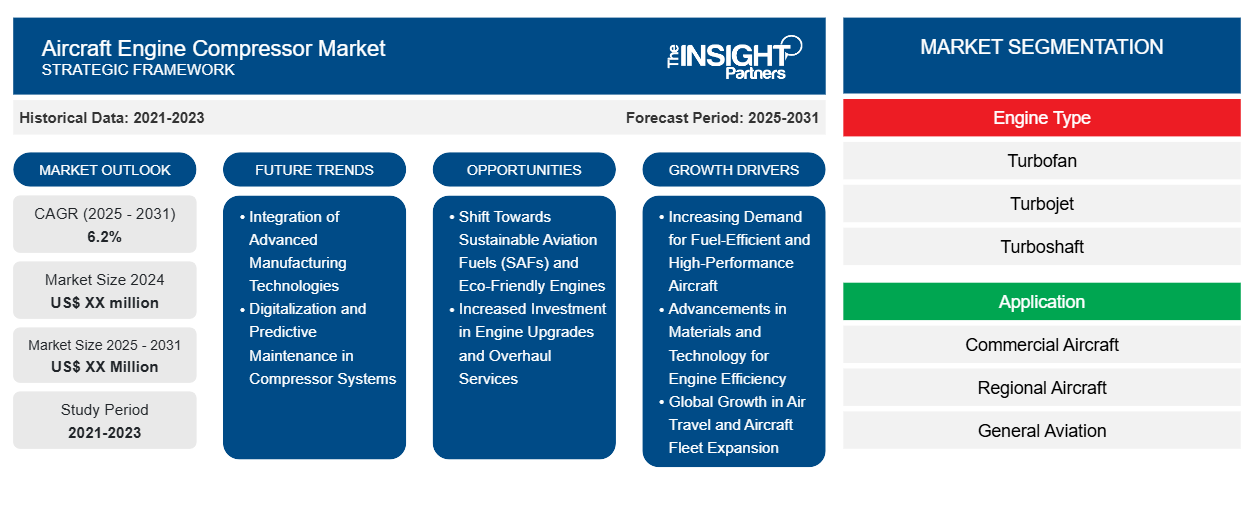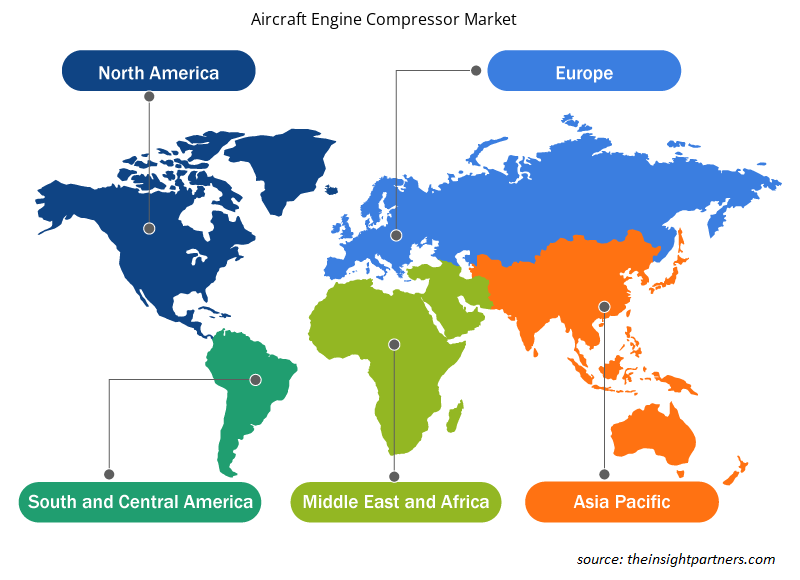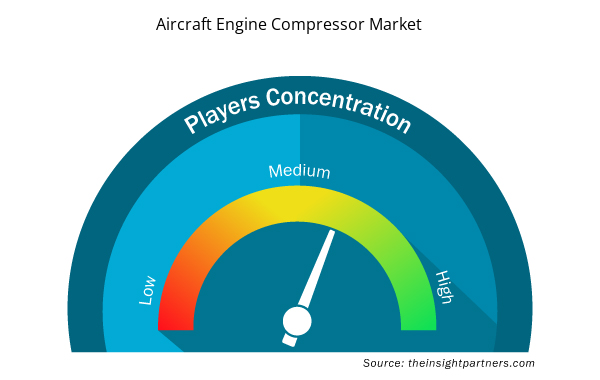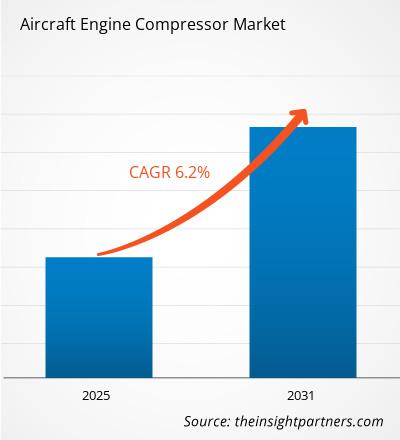The Aircraft Engine Compressor Market is expected to register a CAGR of 6.2% from 2025 to 2031, with a market size expanding from US$ XX million in 2024 to US$ XX Million by 2031.
The report is segmented by Engine Type (Turbofan, Turbojet, Turboshaft); Application (Commercial Aircraft, Regional Aircraft, General Aviation, Military Aircraft); Fit Type (Line Fit, Retrofit). The global analysis is further broken-down at regional level and major countries. The Report Offers the Value in USD for the above analysis and segments.
Purpose of the Report
The report Aircraft Engine Compressor Market by The Insight Partners aims to describe the present landscape and future growth, top driving factors, challenges, and opportunities. This will provide insights to various business stakeholders, such as:
- Technology Providers/Manufacturers: To understand the evolving market dynamics and know the potential growth opportunities, enabling them to make informed strategic decisions.
- Investors: To conduct a comprehensive trend analysis regarding the market growth rate, market financial projections, and opportunities that exist across the value chain.
- Regulatory bodies: To regulate policies and police activities in the market with the aim of minimizing abuse, preserving investor trust and confidence, and upholding the integrity and stability of the market.
Aircraft Engine Compressor Market Segmentation
Engine Type
- Turbofan
- Turbojet
- Turboshaft
Application
- Commercial Aircraft
- Regional Aircraft
- General Aviation
- Military Aircraft
Fit Type
- Line Fit
- Retrofit
Geography
- North America
- Europe
- Asia-Pacific
- South and Central America
- Middle East and Africa
Customize This Report To Suit Your Requirement
You will get customization on any report - free of charge - including parts of this report, or country-level analysis, Excel Data pack, as well as avail great offers and discounts for start-ups & universities
Aircraft Engine Compressor Market: Strategic Insights

- Get Top Key Market Trends of this report.This FREE sample will include data analysis, ranging from market trends to estimates and forecasts.
Aircraft Engine Compressor Market Growth Drivers
- Increasing Demand for Fuel-Efficient and High-Performance Aircraft: One of the primary drivers for the aircraft engine compressor market is the growing demand for fuel-efficient and high-performance aircraft. The aviation industry has made significant strides in developing engines that offer better fuel efficiency, lower emissions, and higher overall performance. Engine compressors play a pivotal role in this process by efficiently compressing incoming air, which is essential for enhancing engine performance. As manufacturers continue to focus on reducing fuel consumption and operational costs, the demand for advanced compressor systems that optimize engine efficiency is increasing. Airlines and military operators alike are investing in modern aircraft engines, driving growth in the compressor market.
- Advancements in Materials and Technology for Engine Efficiency: The continual advancements in materials science and manufacturing technologies are also driving the aircraft engine compressor market. New materials such as advanced alloys, composites, and coatings are being used to enhance the performance, weight, and durability of compressors. For example, materials that can withstand high temperatures and pressures are essential for improving compressor efficiency and ensuring that engines operate reliably over extended periods. Innovations in turbine technology, blade coatings, and manufacturing techniques like additive manufacturing (3D printing) are helping reduce compressor weight, which in turn enhances engine fuel efficiency and overall performance.
- Global Growth in Air Travel and Aircraft Fleet Expansion: The global expansion of air travel, particularly in emerging markets in Asia-Pacific, Latin America, and the Middle East, is contributing to a significant increase in the number of commercial aircraft in service. This expansion directly drives demand for new engines and compressors to power these aircraft. Airlines are investing in more fuel-efficient fleets, which requires cutting-edge engine compressors that can deliver improved efficiency, reliability, and performance. Additionally, military aircraft fleets also demand advanced compressors for high-performance engines, further fueling the market.
Aircraft Engine Compressor Market Future Trends
- Integration of Advanced Manufacturing Technologies: One of the key trends in the aircraft engine compressor market is the increasing use of advanced manufacturing technologies, particularly additive manufacturing (3D printing) and advanced casting techniques. These technologies allow for the creation of more complex, lightweight, and efficient compressor components that were previously difficult or impossible to manufacture using traditional methods. Additive manufacturing enables the creation of intricate geometries that optimize airflow and reduce weight, which are crucial for improving engine performance and efficiency. As these technologies become more widespread, they provide a competitive edge to manufacturers who can develop advanced compressor components that meet the growing demands for high-performance, lightweight, and cost-effective solutions.
- Digitalization and Predictive Maintenance in Compressor Systems: Another growing trend is the integration of digitalization and predictive maintenance systems in aircraft engine compressors. With the increasing use of Internet of Things (IoT) technologies and sensors, compressors can be equipped with monitoring systems that collect real-time data on their performance, health, and wear. This data can then be analyzed to predict maintenance needs, optimize performance, and reduce unplanned downtime. Predictive maintenance systems help improve the reliability of aircraft engines and reduce maintenance costs by enabling proactive rather than reactive maintenance. The trend towards more intelligent, data-driven maintenance for compressors is transforming the way airlines and MRO providers manage engine health.
Aircraft Engine Compressor Market Opportunities
- Shift Towards Sustainable Aviation Fuels (SAFs) and Eco-Friendly Engines: The growing focus on sustainability and the adoption of sustainable aviation fuels (SAFs) present new opportunities for the aircraft engine compressor market. SAFs, which are produced from renewable sources, are gaining traction as a more environmentally friendly alternative to traditional jet fuels. As SAF adoption increases, aircraft engine compressors will need to be adapted to handle the unique properties of these fuels, requiring enhancements in compressor design and materials. The push for eco-friendly engines that produce fewer emissions provides an opportunity for compressor manufacturers to develop systems that can operate at higher efficiencies, which would be necessary for achieving reduced carbon footprints.
- Increased Investment in Engine Upgrades and Overhaul Services: As the global fleet of aircraft continues to age, there is an increasing need for engine upgrades and overhaul services. Compressor systems, as integral parts of the engine, often require repair, replacement, or upgrading during engine overhauls. The maintenance, repair, and overhaul (MRO) sector for aircraft engines, including compressors, offers substantial opportunities for companies providing spare parts, high-performance compressors, and innovative technologies for existing engines. Manufacturers of compressor systems can tap into this growing demand for MRO services, offering replacement compressors and specialized maintenance solutions to meet the needs of older and current-generation aircraft.
Aircraft Engine Compressor Market Regional Insights
The regional trends and factors influencing the Aircraft Engine Compressor Market throughout the forecast period have been thoroughly explained by the analysts at Insight Partners. This section also discusses Aircraft Engine Compressor Market segments and geography across North America, Europe, Asia Pacific, Middle East and Africa, and South and Central America.

- Get the Regional Specific Data for Aircraft Engine Compressor Market
Aircraft Engine Compressor Market Report Scope
| Report Attribute | Details |
|---|---|
| Market size in 2024 | US$ XX million |
| Market Size by 2031 | US$ XX Million |
| Global CAGR (2025 - 2031) | 6.2% |
| Historical Data | 2021-2023 |
| Forecast period | 2025-2031 |
| Segments Covered |
By Engine Type
|
| Regions and Countries Covered | North America
|
| Market leaders and key company profiles |
Aircraft Engine Compressor Market Players Density: Understanding Its Impact on Business Dynamics
The Aircraft Engine Compressor Market market is growing rapidly, driven by increasing end-user demand due to factors such as evolving consumer preferences, technological advancements, and greater awareness of the product's benefits. As demand rises, businesses are expanding their offerings, innovating to meet consumer needs, and capitalizing on emerging trends, which further fuels market growth.
Market players density refers to the distribution of firms or companies operating within a particular market or industry. It indicates how many competitors (market players) are present in a given market space relative to its size or total market value.
Major Companies operating in the Aircraft Engine Compressor Market are:
- Bharat Forge
- CFM International
- GE Aviation
- Honeywell International Inc.
- Melrose Industries Plc
Disclaimer: The companies listed above are not ranked in any particular order.

- Get the Aircraft Engine Compressor Market top key players overview
Key Selling Points
- Comprehensive Coverage: The report comprehensively covers the analysis of products, services, types, and end users of the Aircraft Engine Compressor Market, providing a holistic landscape.
- Expert Analysis: The report is compiled based on the in-depth understanding of industry experts and analysts.
- Up-to-date Information: The report assures business relevance due to its coverage of recent information and data trends.
- Customization Options: This report can be customized to cater to specific client requirements and suit the business strategies aptly.
The research report on the Aircraft Engine Compressor Market can, therefore, help spearhead the trail of decoding and understanding the industry scenario and growth prospects. Although there can be a few valid concerns, the overall benefits of this report tend to outweigh the disadvantages.
- Historical Analysis (2 Years), Base Year, Forecast (7 Years) with CAGR
- PEST and SWOT Analysis
- Market Size Value / Volume - Global, Regional, Country
- Industry and Competitive Landscape
- Excel Dataset



Report Coverage
Revenue forecast, Company Analysis, Industry landscape, Growth factors, and Trends

Segment Covered
This text is related
to segments covered.

Regional Scope
North America, Europe, Asia Pacific, Middle East & Africa, South & Central America

Country Scope
This text is related
to country scope.
Frequently Asked Questions
Some of the customization options available based on request are additional 3-5 company profiles and country-specific analysis of 3-5 countries of your choice. Customizations are to be requested/discussed before making final order confirmation, as our team would review the same and check the feasibility.
The report can be delivered in PDF/PPT format; we can also share excel dataset based on the request.
Some of the major trends driving the aircraft engine compressor market are:
1. Increasing Demand from Chartered Aircraft
The major factors driving the aircraft engine compressor market are:
1. Demand for Deliveries of Commercial and Civil Aircraft
2. Increasing Procurements of Military Aircraft
The Aircraft Engine Compressor Market is estimated to witness a CAGR of 6.2% from 2023 to 2031
Trends and growth analysis reports related to Aerospace and Defense : READ MORE..
1. Bharat Forge
2. CFM International
3. GE Aviation
4. Honeywell International Inc.
5. Melrose Industries Plc
6. MTU Aero Engines AG
7. Rolls-Royce Holdings Plc.
8. Safran SA
9. Turbocam Inc.
10. Collins Aerospace

 Get Free Sample For
Get Free Sample For